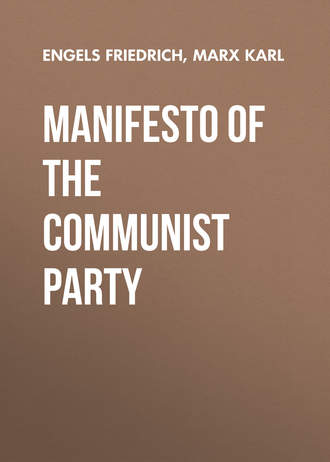
Engels Friedrich
Manifesto of the Communist Party
Modern industry has converted the little workshop of the patriarchal master into the great factory of the industrial capitalist. Masses of laborers, crowded into the factory, are organized like soldiers. As privates of the industrial army they are placed under the command of a perfect hierarchy of officers and sergeants. Not only are they slaves of the bourgeois class, and of the bourgeois State, they are daily and hourly enslaved by the machine, by the over-seer, and, above all, by the individual bourgeois manufacturer himself. The more openly this despotism proclaims gain to be its end and aim, the more petty, the more hateful and the more embittering it is.
The less skill and exertion of strength is implied in manual labor, in other words, the more modern industry becomes developed, the more is the labor of men superseded by that of women. Differences of age and sex have no longer any distinctive social validity for the working class. All are instruments of labor, more or less expensive to use, according to age and sex.
No sooner is the exploitation of the laborer by the manufacturer so far at an end that he receives his wages in cash, than he is set upon by the other portions of the bourgeoisie, the landlord, the shopkeeper, the pawnbroker, etc.
The lower strata of the middle class – the small trades-people, shopkeepers, and retired tradesmen generally, the handicraftsmen and peasants – all these sink gradually into the proletariat, partly because their diminutive capital does not suffice for the scale on which modern industry is carried on, and is swamped in the competition with the large capitalists, partly because their specialized skill is rendered worthless by new methods of production. Thus the proletariat is recruited from all classes of the population.
The proletariat goes through various stages of development. With its birth begins its struggle with the bourgeoisie. At first the contest is carried on by individual laborers, then by the workpeople of a factory, then by the operatives of one trade, in one locality, against the individual bourgeois who directly exploits them. They direct their attacks not against the bourgeois conditions of production, but against the instruments of production themselves; they destroy imported wares that compete with their labor, they smash to pieces machinery, they set factories ablaze, they seek to restore by force the vanished status of the workman of the middle ages.
At this stage the laborers still form an incoherent mass scattered over the whole country, and broken up by their mutual competition. If anywhere they unite to form more compact bodies, this is not yet the consequence of their own active union, but of the union of the bourgeoisie, which class, in order to attain its own political ends, is compelled to set the whole proletariat in motion, and is moreover yet, for a time, able to do so. At this stage, therefore, the proletarians do not fight their enemies, but the enemies of their enemies, the remnants of absolute monarchy, and land owners, the non-industrial bourgeois, the petty bourgeoisie. Thus the whole historical movement is concentrated in the hands of the bourgeoisie; every victory so obtained is a victory for the bourgeoisie.
But with the development of industry the proletariat not only increases in number; it becomes concentrated in greater masses, its strength grows and it feels that strength more. The various interests and conditions of life within the ranks of the proletariat are more and more equalized, in proportion as machinery obliterates all distinctions of labor, and nearly everywhere reduces wages to the same low level. The growing competition among the bourgeois, and the resulting commercial crises, make the wages of the workers ever more fluctuating. The unceasing improvement of machinery, ever more rapidly developing, makes their livelihood more and more precarious; the collisions between individual workman and individual bourgeois take more and more the character of collisions between two classes. Thereupon the workers begin to form combinations (Trades' Unions) against the bourgeois; they club together in order to keep up the rate of wages; they found permanent associations in order to make provision beforehand for these occasional revolts. Here and there the contest breaks out into riots.
Now and then the workers are victorious, but only for a time. The real fruit of their battles lies not in the immediate result but in the ever improved means of communication that are created in modern industry and that place the workers of different localities in contact with one another. It was just this contact that was needed to centralize the numerous local struggles, all of the same character, into one national struggle between classes. But every class struggle is a political struggle. And that union, to attain which the burghers of the middle ages, with their miserable highways, required centuries, the modern proletarians, thanks to railways, achieve in a few years.
This organization of the proletarians into a class and consequently into a political party, is continually being upset again by the competition between the workers themselves. But it ever rises up again; stronger, firmer, mightier. It compels legislative recognition of particular interests of the workers, by taking advantage of the divisions among the bourgeoisie itself. Thus the ten-hours' bill in England was carried.
Altogether collisions between the classes of the old society further, in many ways, the course of the development of the proletariat. The bourgeoisie finds itself involved in a constant battle. At first with the aristocracy; later on, with those portions of the bourgeoisie itself whose interests have become antagonistic to the progress of industry; at all times with the bourgeoisie of foreign countries. In all these countries it sees itself compelled to appeal to the proletariat, to ask for its help, and thus to drag it into the political arena. The bourgeoisie itself, therefore, supplies the proletariat with weapons for fighting the bourgeoisie.
Further, as we have already seen, entire sections of the ruling classes are, by the advance of industry, precipitated into the proletariat, or are at least threatened in their conditions of existence. These also supply the proletariat with fresh elements of enlightenment and progress.
Finally, in times when the class struggle nears the decisive hour, the process of dissolution going on within the ruling class, in fact within the whole range of old society, assumes such a violent, glaring character, that a small section of the ruling class cuts itself adrift, and joins the revolutionary class, the class that holds the future in its hands. Just as, therefore, at an earlier period, a section of the nobility went over to the bourgeoisie, so now a portion of the bourgeoisie goes over to the proletariat, and in particular, a portion of the bourgeois ideologists, who have raised themselves to the level of comprehending theoretically the historical movement as a whole.
Of all the classes that stand face to face with the bourgeoisie to-day, the proletariat alone is a really revolutionary class. The other classes decay and finally disappear in the face of modern industry; the proletariat is its special and essential product.
The lower middle class, the small manufacturer, the shopkeeper, the artisan, the peasant, all these fight against the bourgeoisie to save from extinction their existence as fractions of the middle class. They are therefore not revolutionary, but conservative. Nay, more, they are reactionary, for they try to roll back the wheel of history. If by chance they are revolutionary, they are so only in view of their impending transfer into the proletariat; they thus defend not their present, but their future interests, they desert their own standpoint to place themselves at that of the proletariat.
The "dangerous class," the social scum, that passively rotting class thrown off by the lowest layers of old society, may, here and there, be swept into the movement by a proletarian revolution; its conditions of life, however, prepare it far more for the part of a bribed tool of reactionary intrigue.
In the conditions of the proletariat, those of old society at large are already virtually swamped. The proletarian is without property; his relation to his wife and children has no longer anything in common with the bourgeois family relations; modern industrial labor, modern subjection to capital, the same in England as in France, in America as in Germany, has stripped him of every trace of national character. Law, morality, religion, are to him so many bourgeois prejudices, behind which lurk in ambush just as many bourgeois interests.
All the preceding classes that got the upper hand sought to fortify their already acquired status by subjecting society at large to their conditions of appropriation. The proletarians cannot become masters of the productive forces of society, except by abolishing their own previous mode of appropriation, and thereby also every other previous mode of appropriation. They have nothing of their own to secure and to fortify; their mission is to destroy all previous securities for, and insurances of, individual property.
All previous historical movements were movements of minorities, or in the interest of minorities. The proletarian movement is the self-conscious, independent movement of the immense majority, in the interest of the immense majority. The proletariat, the lowest stratum of our present society, cannot stir, cannot raise itself up, without the whole super-incumbent strata of official society being sprung into the air.
Though not in substance, yet in form, the struggle of the proletariat with the bourgeoisie is at first a national struggle. The proletariat of each country must, of course, first of all settle matters with its own bourgeoisie.
In depicting the most general phases of the development of the proletariat, we traced the more or less veiled civil war, raging within existing society, up to the point where that war breaks out into open revolution, and where the violent overthrow of the bourgeoisie lays the foundation for the sway of the proletariat.
Hitherto every form of society has been based, as we have already seen, on the antagonism of oppressing and oppressed classes. But in order to oppress a class certain conditions must be assured to it under which it can, at least, continue its slavish existence. The serf, in the period of serfdom, raised himself to membership in the commune, just as the petty bourgeois, under the yoke of feudal absolutism, managed to develop into a bourgeois. The modern laborer, on the contrary, instead of rising with the progress of industry, sinks deeper and deeper below the conditions of existence of his own class. He becomes a pauper, and pauperism develops more rapidly than population and wealth. And here it becomes evident that the bourgeoisie is unfit any longer to be the ruling class in society and to impose its conditions of existence upon society as an over-riding law. It is unfit to rule because it is incompetent to assure an existence to its slave within his slavery, because it cannot help letting him sink into such a state that it has to feed him instead of being fed by him. Society can no longer live under this bourgeoisie; in other words, its existence is no longer compatible with society.
The essential condition for the existence, and for the sway of the bourgeois class, is the formation and augmentation of capital; the condition for capital is wage-labor. Wage-labor rests exclusively on competition between the laborers. The advance of industry, whose involuntary promoter is the bourgeoisie, replaces the isolation of the laborers, due to competition, by their revolutionary combination, due to association. The development of modern industry, therefore, cuts from under its feet the very foundation on which the bourgeoisie produces and appropriates products. What the bourgeoisie therefore produces, above all, are its own grave diggers. Its fall and the victory of the proletariat are equally inevitable.






